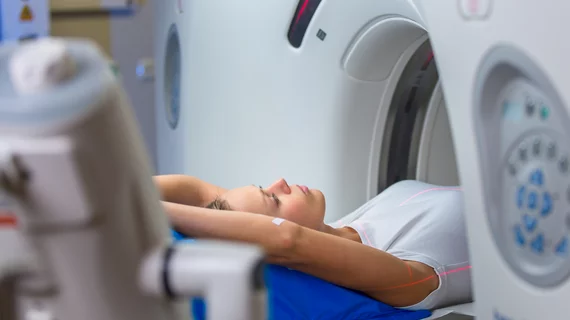Fast breast MRI ready for clinical use following shorter read times, accurate cancer detection
In high-risk women, abbreviated breast MRI protocols require shorter interpretation times while maintaining similar cancer detection rates compared to full-sequence magnetic resonance imaging, according to a recent analysis.
Standard MRI beats out most other modalities at detecting breast cancer, yet its nearly one-hour imaging time can make exams difficult for many patients, experts wrote in the March/April issue of the Journal of Breast Imaging. Such scans also produce thousands of images that need to be read.
Comparing both protocol types among more than 280 women at high risk for breast cancer, each detected all cancers with an equal recall rate. Using abbreviated MRI (abMRI), however, saved nearly 40 seconds per patient.
Extrapolated over a larger patient population and more exams, abMRI could significantly improve breast cancer screenings and may even lower costs, the authors noted.
“The abMRI has the ability to shorten the imaging protocol and thereby decrease the time for the examination, which may substantially and positively affect the availability of MRI for surveillance, as well as improving the patient experience during the examination,” Kendrah V. Osei, BS, of the George Washington University School of Medicine & Health Sciences in Washington, D.C., and colleagues explained.
Abbreviated breast MRI protocols differ across most institutions, but each uses a single post-contrast sequence and far fewer sequences overall, Osei and co-authors explained. And past studies have shown these exams match standard MRI’s breast cancer detection rate with similar recall statistics.
Building off this evidence, the researchers retrospectively gathered screening MRI exams performed between January 2013 through the end of December 2016. Breast imaging specialists utilized patient history, prior imaging and abbreviated MR scans for their interpretations. And after 30 days, these expert radiologists read the full protocol MRI scans.
Both MRI types detected all five cancers across the 332 total exams included in the study. Abbreviated scans were interpreted in 60.7 seconds compared to 99.4 seconds for fpMRIs, an average difference of 38.7 seconds per patient, the authors noted. Recall rates differed by 0.3% in favor of full protocol exams.
Despite a few limitations, including the retrospective and single-institution design, the researchers believe it’s time to utilize faster MRI exams in daily practice.
“Our findings, along with those previously reported, suggest that the use of abMRI may be safely integrated into clinical practice,” Osei and colleagues concluded. “The shorter exam time of an abMRI may allow for equal cancer detection with an improved patient experience and greater MRI availability.”

